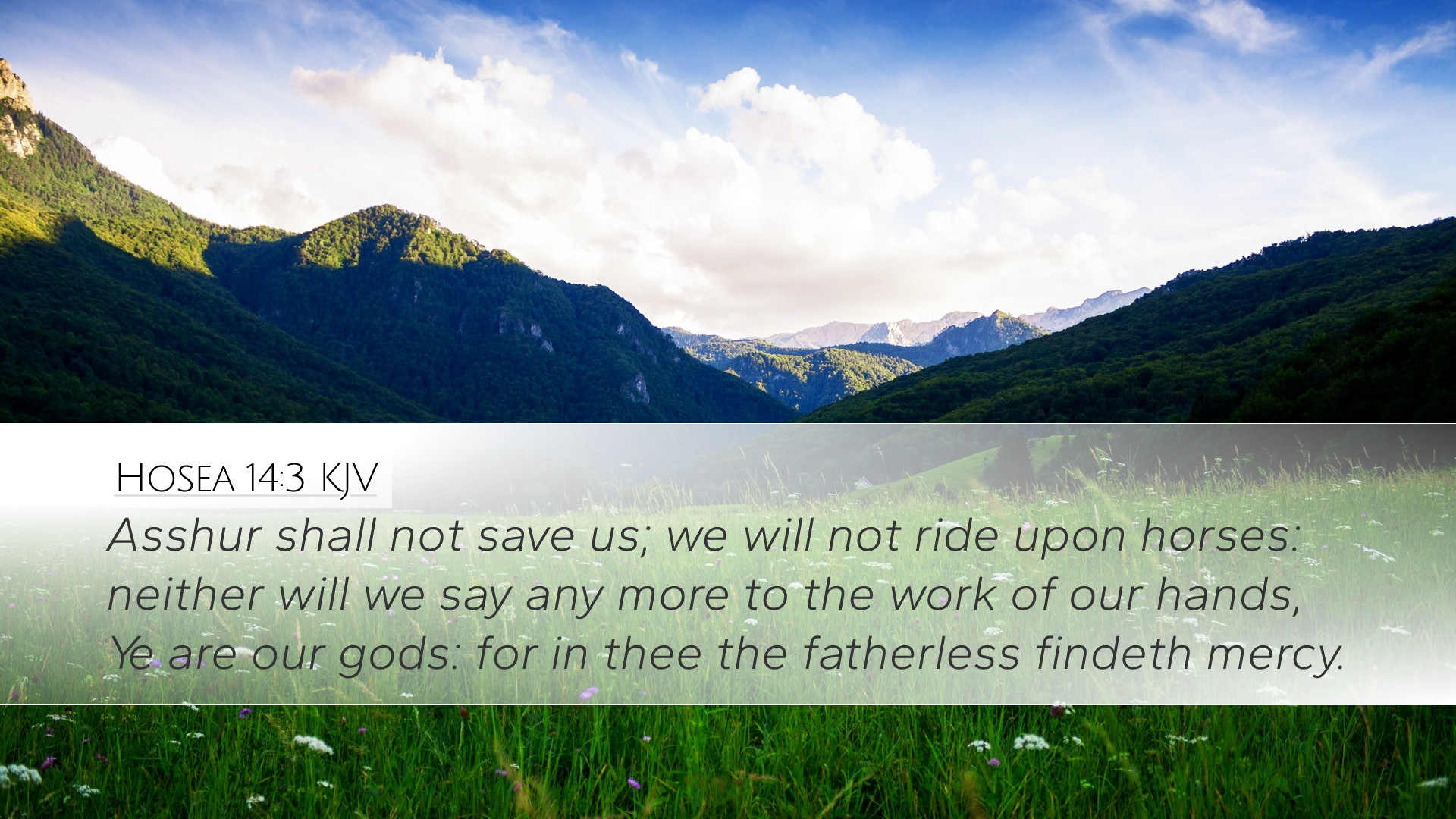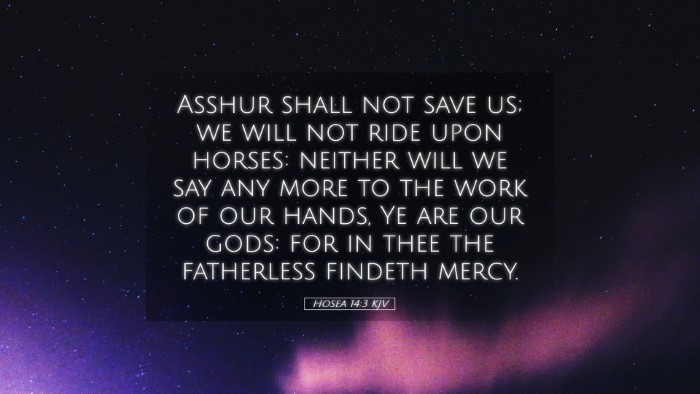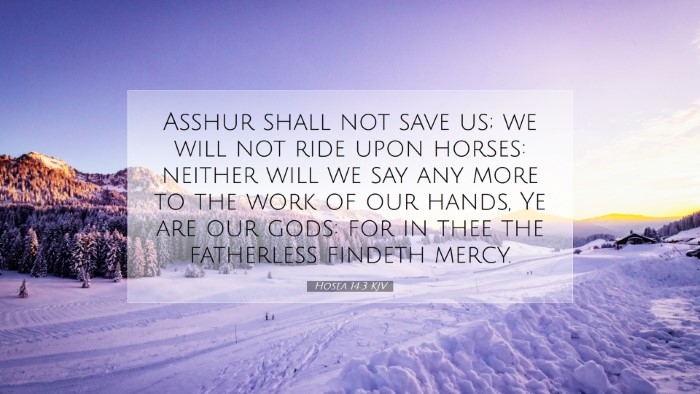Old Testament
Genesis Exodus Leviticus Numbers Deuteronomy Joshua Judges Ruth 1 Samuel 2 Samuel 1 Kings 2 Kings 1 Chronicles 2 Chronicles Ezra Nehemiah Esther Job Psalms Proverbs Ecclesiastes Song of Solomon Isaiah Jeremiah Lamentations Ezekiel Daniel Hosea Joel Amos Obadiah Jonah Micah Nahum Habakkuk Zephaniah Haggai Zechariah MalachiHosea 14:3
Hosea 14:3 KJV
Asshur shall not save us; we will not ride upon horses: neither will we say any more to the work of our hands, Ye are our gods: for in thee the fatherless findeth mercy.
Hosea 14:3 Bible Commentary
Commentary on Hosea 14:3
Verse Text: "Asshur shall not save us; we will not ride upon horses: neither will we say any more to the work of our hands, Ye are our gods: for in thee the fatherless findeth mercy."
Context and Overview
The Book of Hosea is a prophetic text that illustrates the relationship between God and His people, drawing heavily on the themes of love, repentance, and restoration. In this final chapter, Hosea calls Israel to return to the Lord, emphasizing the futility of reliance on foreign powers and false idols. This verse encapsulates the essence of Israel's repentance and their recognition of their utter dependence on God.
Theological Significance
Hosea 14:3 carries deep theological implications that resonate with the larger narrative of scripture. Here, Israel acknowledges their past errors and sins, turning away from their idolatrous practices and political alliances. This repentance is crucial as it marks a significant turning point in their relationship with God.
1. Admissions of Futility
In the phrase, "Asshur shall not save us," Hosea addresses Israel's misplaced trust in Assyrian power. Matthew Henry emphasizes that Israel had relied on Assyria as a military ally rather than turning to the Lord. Likewise, Albert Barnes notes that such reliance signifies spiritual failure, indicating a reliance on human strength instead of divine providence.
2. The Rejection of Idolatry
The latter part of the verse, "neither will we say any more to the work of our hands, Ye are our gods," reveals the profound shift in Israel's mindset. Adam Clarke interprets this as a renunciation of idolatry, where Israelites acknowledge the impotence of idols. This rejection is a significant step toward spiritual restoration as expressed succinctly throughout the prophetic writings.
Insights from Commentators
The insights provided by various public domain commentaries collectively further enrich the understanding of this verse.
- Matthew Henry: He suggests that real repentance involves a clear recognition of sin and an earnest desire to return to God. Henry notes the importance of the "fatherless," highlighting how God's mercy is particularly aimed at those in desperate need—reflected in the last phrase of the verse.
- Albert Barnes: Barnes emphasizes the importance of acknowledging where true help comes from. He points out that this declaration of dependence upon God signifies a turning away from self-reliance and trusting in spiritual resources rather than material or political alliances.
- Adam Clarke: Clarke presents the idea that acknowledging God's sovereignty is foundational for healing and restoration. He points out that while the nation had sought security and identity in their own creations, true identity and safety lie in embracing divine mercy.
Practical Implications
For pastors, students, theologians, and Bible scholars, Hosea 14:3 provides critical reflections on modern faith practices. The same caution against idolatry and misplaced trust is relevant today.
1. Reliance on God
This passage challenges contemporary believers to evaluate where they place their trust. Whether in governmental systems, societal norms, or personal achievements, the text underscores the necessity of turning to God alone as the source of salvation and security.
2. Repentance in Community
The communal aspect of this passage—a national call to repentance—serves as an important model for church leadership. Pastors can looked to this as a template in leading congregations through seasons of reflection and renewal, encouraging corporate acknowledgment of sin and realignment of priorities toward godliness.
3. The Inclusive Nature of God’s Mercy
The reference to “the fatherless” reveals a profound theological truth about God’s character; His mercy is available to the most vulnerable and marginalized in society. This prompts church leaders to reflect on how they extend that mercy within their communities and emphasizes advocacy for those in need.
Conclusion
Hosea 14:3 transcends its ancient context to offer timeless insights into the nature of repentance, the folly of idolatry, and the boundless mercy of God. By examining this verse through diverse theological lenses, we gain a more robust understanding of how personal and communal faith intersect. It challenges us to reflect on our own lives and the collective faith of our communities, urging us toward deeper reliance on God, genuine repentance, and a commitment to reflect His mercy.


